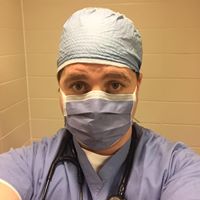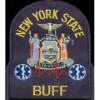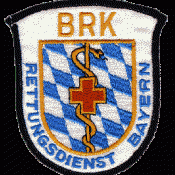Leaderboard
Popular Content
Showing content with the highest reputation on 09/28/2011 in Posts
-
Don't get hung up on buying equipment or the great stethoscope debate. Learn your priorities now and it'll help prevent burn-out. Priority one: yourself. Long before you go nuts with gear for scenes and patient care, consider your working environment and how to make the best of it. Look at your boots, socks, underwear; are they going to keep you comfortable and dry during the shift? Beyond that, get a good water bottle and keep it filled. Pick some healthy snacks for the truck and if you don't have a station where you can cook, make sure you get in the habit of packing a good lunch now before you start hitting the junk while on the road. If you don't have a base, toss a good neck pillow in your bag to help you rest in the truck when you can. Pack reading materials, some work related to keep current, and others just for fun so you can relax. Consider an ipod or portable dvd player. Toss some advil or aleve in your bag along with non-drowsy cough/cold medication for the aches and pains. You also can't go wrong with some travel toiletries (your partners will thank you for reapplying deodorant when necessary). Once you've done all that, then maybe look at a stethoscope that'll suit your needs and any other toys that will let you enjoy the new eager phase. Don't be put off by those that would call it being a "whacker"; as long as it's within reason, this is just the natural enthusiasm of a new job. Though do yourself a favour, no EMS tatoos until you're at least 15 years in.4 points
-
No Underwear - Makes Sense to Me A man came to visit his grandparents, and he noticed his grandfather sitting on the porch in the rocking chair wearing only a shirt, with nothing on from the waist down. 'Grandpa, what are you doing? Your weenie is out in the wind for everyone to see!' he exclaimed. The old man looked off in the distance without answering. 'Grandpa, what are you doing sitting out here with nothing on below the waist?' he asked again. The old man slowly looked at him and said, 'Well....last week I sat out here with no shirt on and I got a stiff neck. This is your grandma's idea.'2 points
-
Agreed, Kiwi. Pain is pain. It doesn't matter what the cause is, you should do what you can to treat it. The cause may change the gameplan, but it shouldn't change the goal. EDIT: We currently have 3 or 4 threads that have been turned into race discussions. Let's not let the local troll take another one down that road.2 points
-
2 points
-
At least my duty day is over. Oktoberfest in Munich is "the largest festival of the world", yearly celebrating the anniversary of the marriage of King Ludwig I. of Bavaria to Princess Therese on 12th October 1810. Sixteen to eighteen days (depends on yearly holidays) long, starting end of each September. Fourteen large beer tents (large = approx. 4.000 to 10.000 seats) and some little ones. Around 6 million visitors in two weeks, this makes between 200 and 400 thousand visitors each day - the size of a city in it's own. Sometimes around seven persons per square meter, if tents are populated (which they are each early afternoon), dancing and chanting. They will intake more than 7 million litres of beer, half a million chickens ("Hendl"), over 100 oxen, 40 tons of fish and around 120 thousand portions of pork sausages ("Bratwurst") plus a lot more of beverages and sweets. A lot of rides and attractions will serve those who are willing to have fun outside a beer tent. Each day, 120-150 volunteer Red Cross medics, EMTs and doctors take care of the festival visitors, accompanied by the normal Munich city EMS which is reinforced by approx. 10 ambulances around the festival grounds. From 09:00 a.m til 02:00 am the next day, they staff a large central medical post, three outside medical aid stations (container) and ten mobile stretcher teams. This year, again, I was one of them. The central medical post consists of six emergency treatment cabins, one intensive care unit, two stitching cabins, a 16 place monitoring unit for drunks and two resting areas for male and female guests. There, a medic and a doctor will triage the incoming patients, more doctors and medics/EMTs will treat those in need (or monitor until getting better) and - if needed - request transport to a hospital. The stretcher teams are the ones responding on the festival grounds, by foot. At least one tactical team leader, one responsible medic and two EMTs per team take over primary care and transport to the central medical post, if applicable. Often, they will call in direct help from an ambulance, if patient conditions are worse. Medical equipment is a jump bag, oxygene and an AED, the stretcher is carried on wheels and covered with a special designed weather (and view) protection. The small outside aid stations are containers, equipped with the same as the stretcher team plus a closet full of band aids and stuff. One medic and one or two EMTs try to make their best there, assisted by called in stretcher teams or ambulances. Personally I had 61 treatments this day. My patient's nationalities (and languages) were: italian, canadian, united states, england, denmark, norway, austrian, australian, irish, spanish, german and some more (in no special order). The usual thing are blisters from shiny new lady shoes. Others involve head aches (non-alcohol related, since the other type usually comes the day after) and small flesh wounds. A young gentlemen accidentally tried to sit in a broken bottle and took a deep cut in his thigh, loosing a lot of blood, sputtering over his new pair of "Lederhosen" (and the floor of our post), needed i.v. access and a fast ambulance ride into an OR. Two girls had severe migraine pain, nearly relevant to their vitals, needing i.v. fluid and medical pain control. One cutting his finger to the bone, a lot of previously taken alcohol saved him a lot from pain. Some more straightly fell on their nose, not aware, that Munich Oktoberfest beer is stronger than usual and served in 1 liter mugs - one probably broken nose, several severe cuts and the loss off some teeth were the results. Two bee stings needed our attention, but only with local allergical reactions. A kid tried to run fast in a mirror maze, always a bad idea - resulting in a large bulge and a slight commotio. Some people just couldn't stand the wild roller costers and carousels, needing a timeout under blood pressure monitoring. One gentleman was brought by two of his friends, their diagnosis was clear: "He's drunk!". Yes, just like anybody else here, except us service workers. "But he walks funny!". Well, should I really explain to some 50 year old dudes, what alcohol can do to the human body's equilibrium sense? And that it's all OK as long as he generally knows where the sky is? "We'll take you by your word!" - yes, but take him with you, we simply don't have spare place for over 100'000 of his kind... Only one real drunk (without any additional medical condition) was to be taken care for. Just couldn't make his way home alone, constantly fell to sleep. A stretcher team eventually brought him to the monitoring unit... Then finally a nice little old lady with dementia, lost on the Oktoberfest (but not worried about) was handed over to the police. And that were only some of my patients this year, out of approx. total 700 this day - nothing but a normal shift on Oktoberfest. At least I wasn't attacked this year, no one tried to actively bleed or vomit on me and no drunk australian girl screamed name-callings in my ear at 5 centimeter distance (as last year). One day and night of sleep and all is bright again, forgetting blood and vomit, remembering only the nice talks, short lady "Dirndl" skirts, "Bratwurst" and "Hendl" smell, light shows and all the fun we had in our team. Let's see, what next year brings... Greetings to the visiting EMS fellows from the U.S., Canada and Denmark I found some minutes to talk to (actually wishing good luck to the canadian guy). And thanks to the colleagues of Italian White Cross, officially supporting us with their italian language skills, for their great help. Some links: Oktoberfest on Wikipedia official Oktoberfest homepage (english) Red Cross homepage of Oktoberfest medical coverage (german) Hope you enjoyed this report...1 point
-
Seriously, do yourself a favour; wait. Give yourself a year minimum in the field, maybe even two to gain some perspective. You can dump a tonne of money into this stuff unnecessarily. Truly consider how you can best help someone off-duty and you'll realize the most useful things you can provide are a good 911 call, a calm presence, a blanket and nothing more complicated than you'd find in the average first aid kit.1 point
-
Therotically: yes. In real: no, but for technical reasons. Usually, the drunks need one or two hours to recover fully enough to crawl out of the medical station. If you're not one of the real early ones, then the beer tent you want to get back usually has closed gates until then - they are overfilled at early afternoon, on weekends even short after opening. If you leave, you have lost. BTW: it's not a tent anymore (was, when I started working there). Since several years they have a fixed building as central post, kind of a emergency hospital. Drunk's monitoring room is special tempered and cleanable...(and the best EMT training area for practising i.v. access). Some are. Sometimes the women also. But that's not a medical problem, so I don't see much of them. Flirt factor is high in the medical station, though. If you come over, just drop me a note. Next year Oktoberfest starts at September,22nd (til October, 7th). Well, don't ask the medics at 02:00 in the morning if they want to come again...but, a year later, they'll be there. Yes, it's fun to work there and to see the festival from the other side. The most astonishing is, that you have not only drunks but much more emergencies of all kinds, through the book, you almost never see in the field elsewhere - plus the alcohol. Which makes things not easier. It's fun to visit Oktoberfest without working there as well, but pretty high priced - there are cheaper ways in Bavaria to just get drunk. For tourists it's a must see, though. So, you don't have an excuse anymore not coming over here!1 point
-
While we know there should not be one, we acknowledge that there is one. I, for one, don't know why, or how, if it is possible, to eliminate it.1 point
-
lol some of these things, you guys definitely SHOULD have been taught in class! A few of my own: - The need for resilient patient advocacy in the face of everyone else (partner, police, supervisor, fire department, family) wanting you to take a shortcut. Don't ever get lazy or forget that your patient comes first. - How critical the turn-over report really is. Specifically, the first 10 seconds of a turnover report. You make an impression either way, but it is up to you to capture your audience or not. They won't wait for you. - How little we really know. Be humble. You are the brains and experience out in the field but anywhere else in medicine you are just an infant with an ego. Try to remind yourself of that on a daily basis. - Don't fall into the trap of eating out all the time. - That it isn't your emergency. People say this all the time in school but it doesn't really hit home till you're out there for a while. It is your job to be calm and retain the ability to look at things objectively. That means you need to stay above the hysteria by whatever means necessary. - How important it is to look and act professionally at all time. It matters more than we realize, to both our patients and our colleagues. - Continuing education. Do it. Not just the minimum. Find out what the outcome was with your patients and reevaluate your approach constantly. - etc.1 point
-
Well we can speculate on both sides all day, neither of us have true statistics, but if you believe that there has only been one qualified female candidate in just that county, and the surrounding rural counties that border it, IN 40 YEARS, I believe it would be you that would be asinine. I worked for a rural county with a population of 6k in the whole county, and they had 4 female firefighters, and 3 female EMT/medics. I guess the entire gulf coast is uterine-free. And you should know better than anyone, firefighters dont take jobs for money, they take them for benefits. But by all means, keep on your rose colored glasses that filter out the glaring truth, we wouldn't want you to actually see the world as it really is. It must be nice to be so white that you can honestly believe discrimination died in the 60's.-1 points
-
You are all Re-TARDs. If you are a male waitress, you may not be able to be hired at Hooters, but in any town that has a hooters, there will be several other restaurants you can work at. In most towns, there is only one Fire Department or at best a county fire department and 2-3 city departments. Take your hoods off, douse the crosses you set fire too, and realize that as whites, you can not speak to something you have never experienced --- discrimination.-2 points






